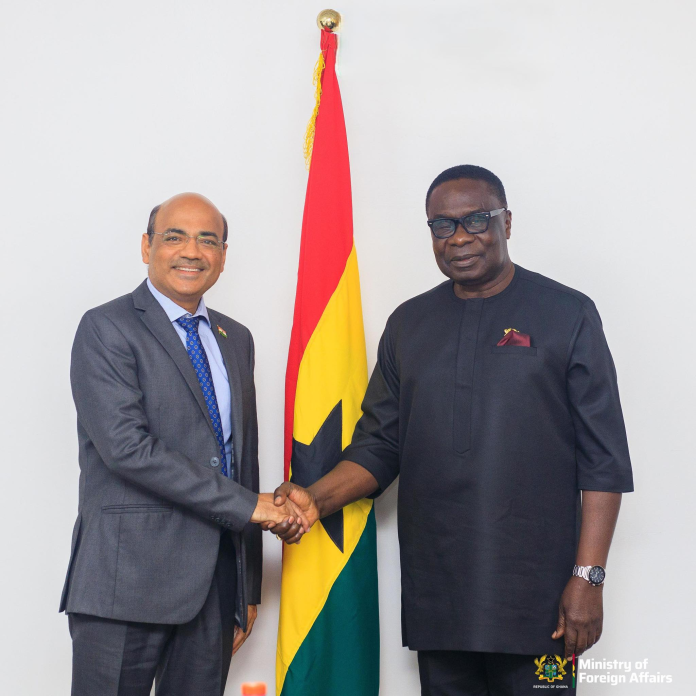Ghana and India are positioning themselves for deeper strategic partnership across critical economic sectors, with discussions between senior officials revealing expanded cooperation frameworks in technology, agriculture, and renewable energy investments.
High Commissioner Manish Gupta and Deputy Foreign Affairs Minister James Gyakye Quayson held comprehensive talks in Accra focusing on business partnerships that directly align with Ghana’s national development priorities, particularly in areas where Indian expertise could accelerate local capacity building.
The discussions emphasized strengthening digital skills development, with Deputy Minister Quayson acknowledging India’s sustained support through the Kofi Annan Centre of Excellence in ICT. Both officials agreed that scaling technology partnerships remains essential for enhancing Ghana’s competitive positioning in the rapidly evolving digital economy.
India’s commitment to Ghana’s “Feed Ghana Agenda” emerged as a central theme, with High Commissioner Gupta reaffirming Indian investment intentions in value addition initiatives and agricultural technology transfer. The partnership approach focuses on comprehensive agribusiness cooperation, particularly targeting food processing capabilities and enhanced market linkages.
The agricultural cooperation builds on existing frameworks, with both countries recognizing potential for expanded collaboration that could transform Ghana’s agricultural productivity while creating new export opportunities. Technology transfer components aim to modernize farming techniques and improve post-harvest processing capacity.
Renewable energy solutions featured prominently in the bilateral discussions, with both sides exploring clean energy projects that support Ghana’s sustainable development transition while creating business opportunities for Indian companies with expertise in solar and wind technologies.
High Commissioner Gupta announced significant expansion of scholarship opportunities for Ghanaians under the Indian Technical and Economic Cooperation programme, demonstrating India’s long-term commitment to human resource development in Ghana. The enhanced ITEC programme represents a substantial increase in educational support for Ghanaian students pursuing technical and professional development in Indian institutions.
The scholarship expansion aligns with India’s broader strategy of strengthening institutional cooperation with Ghana, particularly in areas where Indian educational institutions possess recognized expertise. This approach has historically produced graduates who contribute significantly to Ghana’s development across various sectors.
Both officials emphasized implementing existing Memoranda of Understanding between the countries, particularly agreements designed to facilitate trade and investment flows. The commitment to MoU implementation suggests both governments recognize the need for translating diplomatic agreements into practical economic outcomes.
The partnership discussions reflect broader trends in Ghana-India relations, which have strengthened considerably following President Mahama’s return to office. High Commissioner Gupta has consistently emphasized continuity in bilateral relations while identifying new opportunities for expanded cooperation.
India’s approach to Ghana represents part of its broader African engagement strategy, with Ghana serving as a strategic partner for accessing West African markets while providing a stable investment environment for Indian businesses seeking regional expansion opportunities.
The technology partnership component specifically targets digital skills development that could position Ghana as a regional technology hub. Indian companies possess significant expertise in information technology services and digital infrastructure development that could benefit Ghana’s growing technology sector.
Agricultural cooperation extends beyond basic farming techniques to include value chain development, food processing technology, and market access facilitation. These initiatives could significantly enhance Ghana’s agricultural export capacity while improving food security through increased productivity.
The renewable energy focus addresses Ghana’s growing energy demands while supporting environmental sustainability objectives. Indian companies have demonstrated expertise in deploying renewable energy solutions in developing country contexts, making them ideal partners for Ghana’s clean energy transition.
For Ghana, the expanded partnership with India provides access to proven development models and technologies while offering opportunities for knowledge transfer that could accelerate industrial development. The comprehensive approach spanning multiple sectors creates potential for sustained economic growth driven by enhanced productivity and competitiveness.
The commitment to deeper cooperation positions both countries for mutual benefit, with Ghana gaining access to Indian expertise and investment while India secures strategic partnerships in a key West African market with significant growth potential.
Source: newsghana.com.gh











